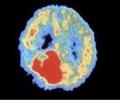A protein that enables cancer cells to grow, invade tissues and eventually resist chemotherapy and has lethal consequences for patients was found by researchers.

"Cancer cells inside the body live in a very complex environment or neighborhood. Where the tumor cell resides and who its neighbors are influence its response and resistance to therapy," said senior author Peter S. Nelson, M.D., a member of the Hutchinson Center's Human Biology Division.
Nelson and colleagues found that a type of normal, non-cancerous cell that lives in cancer's neighbourhood - the fibroblast - when exposed to chemotherapy sustains DNA damage that drives the production of a broad spectrum of growth factors that stimulate cancer growth.
Under normal circumstances, fibroblasts help maintain the structural integrity of connective tissue, and they play a critical role in wound healing and collagen production.
Specifically, the researchers found that DNA-damaging cancer treatment coaxes fibroblasts to crank out a protein called WNT16B within the tumour neighbourhood, or microenvironment, and that high levels of this protein enable cancer cells to grow, invade surrounding tissue and resist chemotherapy.
The researchers observed up to 30-fold increases in WNT production - a finding that was "completely unexpected," Nelson said.
Advertisement
This discovery suggests that finding a way to block this treatment response in the tumour microenvironment may improve the effectiveness of therapy.
Advertisement
The major clinical reason that chemotherapy ultimately fails in the face of advanced cancer, Nelson said, is because the doses necessary to thoroughly wipe out the cancer would also be lethal to the patient.
"In the laboratory we can 'cure' most any cancer simply by giving very high doses of toxic therapies to cancer cells in a petri dish. However, in people, these high doses would not only kill the cancer cells but also normal cells and the host," he said.
Therefore, treatments for common solid tumours are given in smaller doses and in cycles, or intervals, to allow the normal cells to recover. This approach may not eradicate all of the tumour cells, and those that survive can evolve to become resistant to subsequent rounds of anti-cancer therapy.
The study was recently published online in advance of print publication in Nature Medicine.
Source-ANI














